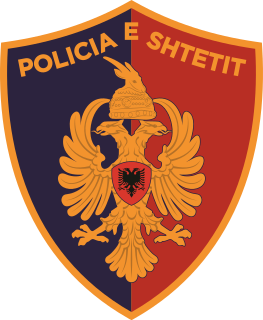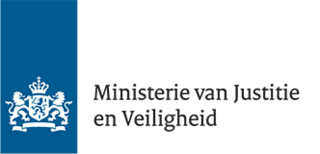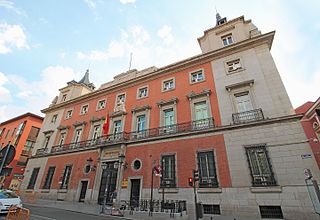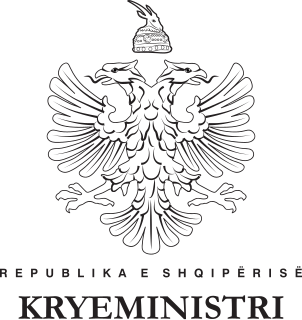The Royal Ministry of Justice and Public Security is a Norwegian government ministry in charge of justice, police, and domestic intelligence. The main purpose of the ministry is to provide for the maintenance and development of the basic guarantees of the rule of law. An overriding objective is to ensure the security of society and of individual citizens. The ministry was founded in 1818 and currently employs about 400 people in the central government department. Its subordinate agencies include the Norwegian Police Service, the Norwegian Correctional Service, the Norwegian Police Security Service, the Norwegian Prosecuting Authority, the Judiciary of Norway, and the Directorate of Immigration, and employ around 30,000 people. The Ministry of Justice of Norway oversees the administration of justice in Svalbard.
A justice ministry, ministry of justice, or department of justice is a ministry or other government agency in charge of the administration of justice. The ministry or department is often headed by a minister of justice or secretary of justice. In countries where this agency is called a department the head of the department is entitled attorney general, for example in the United States. Monaco is an example of a country that does not have a ministry of justice, but rather a Directorate of Judicial Services that oversees the administration of justice. Vatican City, a country under the sovereignty of the Holy See, also does not possess a ministry of justice. The legislative body is overseen by the President of the Pontifical Commission for Vatican City State.

The Federal Ministry of Finance, abbreviated BMF, is the cabinet-level finance ministry of Germany, with its seat at the Detlev-Rohwedder-Haus in Berlin and a secondary office in Bonn. The current Federal Minister of Finance is Olaf Scholz (SPD).

The Albanian State Police is the national police and law enforcement agency which operates throughout the Republic of Albania. The collapse of the Communist system and the establishment of political pluralism post-1991 brought important changes to the structure of the Albanian Police. The Ministry of Public Order and the General Directorate of Police were established in April 1991, and the new law of July 1991 established the Public Order Police. Nearly 80% of police manpower, i.e. personnel who had served under the previous system, were replaced by new recruits. On November 4, 1991, the Albanian Police was accepted as a member of Interpol. The emergency number is 129.

The Ministry of Justice and Security is the Dutch Ministry responsible for justice, imprisonment and public security. The Ministry was created in 1798 as the Department of Justice, before it became in 1876 the Ministry of Justice. In 2010, it took over the public safety duties from the Ministry of the Interior and Kingdom Relations and became Ministry of Security and Justice. In 2017 the Ministry was renamed to Ministry of Justice and Security. The Ministry is headed by the Minister of Justice and Security, Ferdinand Grapperhaus (CDA) since 26 October 2017.
The Ministry of Justice is a Cabinet-level ministry of the Government of Sweden which handles matters relating to the justice system, such as legislation concerning the constitution, as well as law enforcement and counter-terrorism procedures. All Swedish law enforcement agencies, as well as the prosecution authorities, the prison and probation service and the National Council for Crime Prevention answer to the Ministry of Justice. In addition to handling constitution-related legislation, the Ministry is responsible for legislation and procedures relating to administrative law, civil law, procedural law and criminal law. The Ministry also deals with matters relating to migration and asylum policy. Internationally, the Ministry of Justice takes part in efforts to co-operate with other nations in order to combat cross-border crime. It is located in the government chancellery Rosenbad in Stockholm.
Law enforcement in Albania is the responsibility of several agencies. The responsibility for most tasks lies with the Albanian State Police, a national police agency, which is under the authority of Ministry of Internal Affairs. Examples of other agencies with limited policing powers are the Municipal Police, which has administrative functions and operates in the local level. They are controlled by mayors.

The Ministry of the Interior is a department of the Government of Spain responsible for public security, the protection of the constitutional rights, the command of the law enforcement agencies, national security, immigration affairs, prisons and road traffic safety.

The Ministry of Justice (MJUS) is the department of the Government of Spain responsible for preparing and carrying out the government policy in order to bring the legal system off, specially in criminal, civil, commercial and procedural law affairs, supporting the Administration of Justice, the legal and international cooperation, guaranting the fundamental right of freedom of worship and the matters related with the Historical Memory Act.

The Ministry of Defence is a department of the Albanian Government, in charge of the formation and implementation of national security and ordering, coordinating and carrying out the general guidelines of the Cabinet about the defence policy and is the headquarters of the Military of Albania.

The Ministry of Finance and Economy is a department of the Albanian Government, responsible for matters relating to economic policy, the central government budget, taxes, banking, security and insurance, international economic work, central, regional and local government.

The Ministry of Agriculture and Rural Development is a department of the Albanian Government in charge of regulation of the economic activity in the agricultural sector of the country with a purpose of increasing the sector's production capacity.

The Ministry of Law and Human Rights is an Indonesian ministry that administers laws and human rights. It is responsible to the president, and is led by the Minister of Law and Human Rights, Yasonna Laoly, since 27 October 2014. The first minister was Soepomo.

The Ministry of Internal Affairs is a department of the Albanian Government, in charge of regulation for the protection of rights and liberties of the Albanian citizens, investigates unlawful acts against the interest of society and state, fights crime, provides civil order, ensures civil security, traffic safety, and protects the security and protection of important individuals.

The Ministry of Internal Affairs is a cabinet-level government ministry of Uganda. It is responsible for the facilitation of "legal and orderly movement of persons to and from Uganda, regulate the residence of immigrants in the country, verify and process Uganda citizenship and enforce national and regional immigration laws for the development and security of Uganda". The ministry is heaed by a cabinet minister, currently General Jeje Odongo. He is assisted by a Minister of State, currently Kania Obiga.

The Prime Minister's Office ; is the official office and residence of the Prime Minister of Albania. It is a ministerial level executive agency within the Government of Albania that handles the ministries and other political matters that are of great importance to the nation, such as corruption and elections. It also consists of the immediate staff of the Prime Minister, as well as multiple levels of support staff reporting to the Prime Minister.

The Ministry of Infrastructure and Energy is a department of the Albanian Government, responsible for national climate policy and international cooperation on climate change, as well as energy issues, meteorology and national geological surveys, electricity, water, wastewater services and industry in Albania.
Gazment Bardhi is an Albanian lawyer and politician who formerly served as Albania's Minister of Justice in 2017. A noted legal expert, he played an important role in the drafting of the much debated Vetting Law, one of the key components of the country's judicial reform process.. On January 19, 2019 Mr. Bardhi was elected as General Secretary of the Democratic Party, defeating his opponent Dorjan Teliti by a vote of 277-44.
Etilda Gjonaj is an Albanian politician, lawyer, and professor. She is currently the Minister of Justice of Albania.

A Ministry of the Republic of Italy is an administrative organ of the Republic of Italy, which participates in Italian public administration and is characterised by one or more specific competencies, with an organised structure, often varying over time.

















